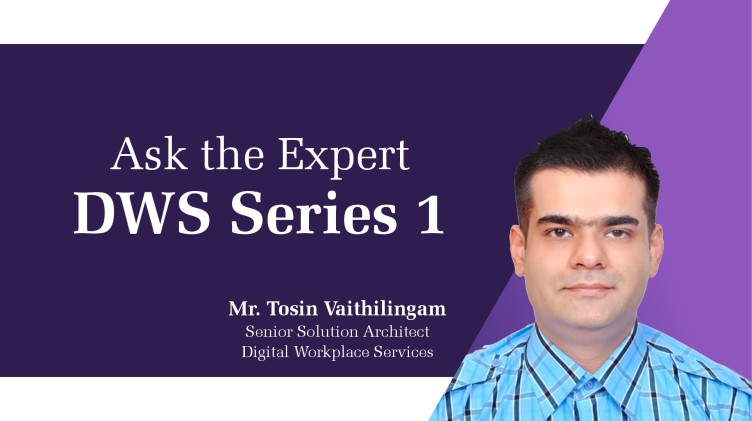Digital workplace service has experienced rapid change and evolution, particularly in recent years. We sat down with Tosin Vaithilingam, an expert solution architect at the forefront of digital workplace transformations to discuss current trends, challenges, and the future of the digital workspace. Following is the insight from the interesting interview as part of our “Ask the Expert Series”
Q: How do you see digital workplace transformation? What have been the important themes in 2023?
A: The digital workplace has become the primary hub for many employees who work remotely for most of their time. Companies strive to support hybrid work environments and focus on delivering a consistent user experience. The emphasis is on streamlining processes and driving efficiency. Companies can significantly reduce time-wasting repetitive tasks by implementing automation at scale across the digital landscape.
Q: You’ve been an architect for several transformation and migration programs. What are the key challenges in the workplace?
A: The main challenges lie in communication and establishing effective relationships with various organizational workforce levels. Adaptation to evolving technology is a pressing concern. A lack of planning and commitment to change also hampers the transition process.
Q: Migrations are notoriously challenging. What’s the secret sauce for successful migration programs?
A: Migration might seem straightforward, but it’s a complex task when businesses handle vast volumes of data daily. The keys to a successful migration are understanding the Data Volume, recognizing Workload Types, and managing the Project Timeline.
Q: How many organizations have adopted a user-experience-centric IT strategy?
A: Sales-driven organizations particularly recognize the importance of streamlined user experiences and self-service processes. Organizations that prioritize something other than a user-experience-centric IT strategy will likely face sustainability issues.
Q: The gig economy and remote work are gaining traction. How will the digital workplace adapt to these changes?
A: The future won’t merely revolve around task management but will emphasize continuous training, reskilling, and work-life balance. The objective will be a workplace encouraging collaboration, innovation, and constant development. Digital transformation is a pivotal means to achieve this.
Q: There’s frequent talk of digital overload. How do you view this issue?
A: Digital overload is a genuine concern. However, employing cognitive and intelligent solutions can simplify IT services. Balancing automation with human intervention is essential. Users should feel both empowered and in control.
Q: How critical is helpdesk automation today?
A: Helpdesk automation uses technology for repetitive tasks like gathering information and ticket routing. Automation assists in ticket prioritization, routing, and providing feedback. It also equips executives with insights on trends, helping budget forecast necessary changes.
Q: Transformation projects often face delays. How can these be managed?
A: Effective communication is crucial. Delays can arise from various factors, including technical issues, budgetary constraints, or scope changes. Setting clear, realistic, and measurable goals can prevent many of these delays.
Q: Lastly, how do you envision the future of the digital workplace?
A: The future workplace will revolve around cognitive tasks. Employees will engage in critical thinking, digital upskilling, and creative problem-solving. Digital tools, continuous learning, and collaboration tools will be fundamental. The modern workplace will blend gig workers and full-time employees collaborating towards shared goals. Hybrid work will be the norm, powered by advanced software and hardware. Collaboration, planning, and communication will be indispensable skills.
As we wrapped up our conversation, it became evident that the future of the digital workplace is not just about technology but about people, processes, and adaptability. The blend of human skill and technological advancement will define the modern workplace’s success.


